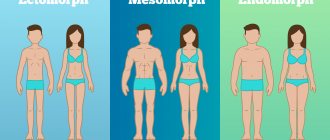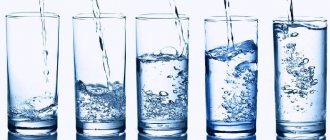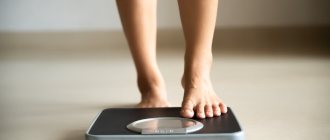Briefly about menopause, stages and signs.
Hormones are responsible not only for health, but also appearance and beauty.
Women feel this especially strongly during menopause, when their weight increases sharply and the amount of fat in the body increases. Is it possible to somehow improve metabolism and restore former slimness? Yes, if you understand the mechanisms of menopause. Menopause (menopause) is a natural process in the endocrine system associated with the decline of reproductive function. Gradually, the synthesis of the female sex hormone estrogen decreases. The process is accompanied by changes in metabolism, which affect appearance, health and mood.
Menopause is not an instant process. It takes years and lasts on average up to 5 years. Menopause consists of stages:
- premenopause. A gradual decrease in estrogen synthesis by the ovaries begins at 28-40 years of age. The period is accompanied by an irregular cycle, menstruation of varying lengths;
- menopause. On average, it occurs at 50-53 years of age. The ovaries turn off and stop producing estrogens. Menstruation stops. The body reacts especially vividly to such fluctuations in hormonal levels. The cardiovascular, musculoskeletal and nervous systems are affected;
- postmenopause. The final stage, which lasts until the end of life. There are no longer sudden mood swings, hot flashes, or sleep disturbances.
Why do hormones decrease?
The unfortunate fact, however, is quite understandable. At birth, the level of hormones is determined by the functions assigned to them. The development of a woman’s reproductive system, breast growth and enlargement, the formation of cyclical changes for the occurrence of the menstrual cycle - all this requires a high content of certain substances in the body. As a woman gets older, these problems are solved, and hormone levels are adjusted accordingly.
By the age of 40, the supply of eggs decreases, and, consequently, the activity of the reproductive system. Interruptions in menstrual flow begin, progesterone is produced in smaller quantities. This causes the endometrium to become thinner and estrogen associated with progesterone to drop. In the 5th–10th year of menopause, menstruation stops completely, since there are no conditions for tissue renewal. In the final stage of decline of the reproductive system, the ovaries completely remove their function of producing estrogen.
Reasons that influence weight gain during menopause.
During menopause, the percentage of body fat increases due to a number of factors:
- Metabolism disorders. Sex hormones affect not only libido, but also the rate of carbohydrate digestion. A decrease in estrogen significantly slows down the process. If previously a woman consumed 1500 calories and was slim, then during menopause, with the same physical activity, excess weight will begin to be deposited;
- Hormonal imbalance. A decrease in estrogen significantly slows down metabolism. The body takes longer to digest fats and carbohydrates;
- Low activity. Menopause is often accompanied by retirement and maternity leave to care for grandchildren. A woman begins to live at a slower pace. A decrease in activity immediately affects your figure: you move less, burn fewer calories, more fat is stored;
- Psychosomatics. Psychologists explain the appearance of excess weight as a hidden resentment towards a person. Women over 50 often harbor many unspoken complaints against their family, adult children, colleagues and environment. This can cause sudden weight gain.
Hormone regimen for menopause
If the last menstruation was less than a year before the start of HRT, therapy is cyclic, i.e. estrogens are administered continuously, and progestogens are administered for 12-14 days, followed by bleeding. It should be borne in mind that treatment carried out cyclically for more than 5 years does not significantly increase the risk of endometrial cancer.
Hormones are used on an ongoing basis if the last menstrual period was more than a year ago or if a woman has been taking cyclic hormone therapy for more than a year and would like to switch treatment without monthly bleeding. Chronic use of hormones has a lower risk of endometrial cancer.
What to do to lose weight during menopause.
- Keep count of calories. The method is very simple: you select products from the Internet or special applications on your mobile phone, add up their calorie content and create a menu. Ideally, it should not exceed 1200 calories.
- Maintain hormonal balance. Preparations with phytoestrogens can alleviate the condition during menopause: “Klimadinon”, “Inoclim”, “Remens”, “Feminal”.
- Maintain drinking regime. To combat hunger, drink at least 1.5-2 liters of water per day.
- To refuse from bad habits. Quit smoking and your appearance will improve. Nicotine negatively affects blood vessels, thickens the blood and increases the risk of heart attacks.
- Vitamins. Vitamins A, E, group B, and trace elements: zinc, potassium, magnesium, selenium help keep weight under control.
- Consultation with a doctor. An examination and consultation with a gastroenterologist or nutritionist will help you adjust your diet so that your gastrointestinal tract does not suffer, but you also do not gain excess weight. The doctor also selects a personal caloric intake based on your parameters and activity.
Femoston is one of the options for treating symptoms in menopausal women
To understand how HRT works, you can look at the effects of a drug commonly prescribed in Europe. Femoston is a medicine containing hormones - micronized 17β-estradiol and dydrogesterone.
Femoston
There are 3 different pharmaceutical forms of the drug with different dosages, selected individually by the gynecologist.
For example, Femoston 1 mg / 10 mg is a cyclic treatment in low doses, i.e. estrogens are administered continuously, and gestagens - for 14 days. After taking them, the patient experiences bleeding. The packs contain 28 tablets, taken 1 tablet at a time without a break. Each tablet contains 1 mg of 17β-estradiol, and the last 14 tablets contain 10 mg of dydrogesterone. The drug is used if the last menstruation was less than a year before the start of treatment. This combination of hormones is usually well tolerated. Adverse reactions occur rarely. Common ones include: headache, pain in the back, stomach or chest, hypersensitivity of the mammary glands.
A continuous hormone therapy regimen is used if the last menstrual period was more than a year in menopausal women or more than 2 years before the onset of premature ovarian failure. In this case, the medicine contains 28 tablets. Each tablet contains the same ratio of 17β-estradiol and dydrogesterone. The drug is taken daily, 1 tablet without a break.
This treatment option is indicated for women suffering from symptoms of estrogen deficiency or for the prevention of osteoporosis in women at increased risk of fractures who cannot tolerate or are prohibited from taking other medications to prevent osteoporosis. The protective effect on bone depends on the dose of estrogen. Research has shown that hormones introduced during perimenopause have long-lasting protective effects on bones for many years even after discontinuation.
What dose of drugs for HRT should I choose? The general rule is that the optimal dose and duration of treatment are individualized based on the severity of symptoms and response to the prescribed treatment.
Treatment is often started with the lowest but effective dose of estrogen, i.e. preparation containing 1 mg of estradiol 17-β. If symptoms persist for approximately 2–3 months, the dose is increased. For most women, a low dose of 1 mg of estrogen is sufficient to relieve symptoms. Very low doses of estradiol 0.5 mg are effective in controlling subjective symptoms and maintaining bone mineral density in postmenopausal women.
According to the International Menopause Society, dydrogesterone, which is included in HRT drugs, is associated with a better breast cancer risk profile than synthetic progestins. But HRT in any case should not be used by women diagnosed with:
- breast cancer;
- pathology of the uterine mucosa;
- unexplained genital bleeding;
- venous thromboembolism (deep vein thrombosis, pulmonary embolism);
- thrombophilic embolism;
- arterial thrombolysis;
- acute liver disease;
- porphyria;
- allergies to the active substance.
Breast cancer
List of foods that need to be excluded from the diet during menopause.
A balanced diet during menopause excludes:
- alcohol. Ethyl alcohol itself is a high-calorie product. Plus, alcohol whets your appetite, so it’s easy to overeat during a feast;
- salt. During menopause, it is dangerous to get carried away with snacks and marinades. Salt provokes stagnation of fluid in the body, the appearance of edema;
- sugar. Hormonal changes increase blood glucose levels and significantly increase the risk of developing diabetes. Therefore, sugar and confectionery products are excluded from diets, replacing them with dried fruits and honey;
- bakery products. Due to a decrease in metabolic rate, even a slice of bread can be deposited on the waist in the form of an unattractive fold;
- saturated fats. These are the substances that clog blood vessels, are deposited as fat at the waist and do not benefit the body. If possible, exclude butter, ice cream, cream, and whole milk from the diet during menopause in order to lose weight.
Lifestyle after 45 years: 10 basic rules
Every age and state of the female body is beautiful in its own way. They require lifestyle adjustments, which will always allow you to look good. If you have been playing sports all the time and controlling your diet, then you don’t really need to change anything. Otherwise, you need to learn a few simple rules and follow them in order to easily answer the question of how to lose weight during menopause:
- Fractional meals. The number of “tables” per day can be 4-6, the weight of each serving should not exceed 300-350 g, so that everything eaten is spent on replenishing energy losses, and does not create a fat depot.
- It is imperative to drink up to 1.5 liters of water (6-8 glasses) during the day. It should not contain gases and sugar. This helps remove toxins, break down fats, and makes the skin elastic.
- Before each meal, drink a glass of water or eat unsweetened fruit. This will allow you to “start” your stomach, eat less, feeling full.
- Chew your food thoroughly. It’s not for nothing that the classics of Russian literature wrote this way; this useful advice must be followed. This promotes better digestion of food, speeds up the metabolic process, and reduces the risk of overeating.
- Be sure to have a hearty breakfast. This is the main meal, which should be based on proteins and “long” carbohydrates.
- You can snack on light fruits, dried fruits or nuts, but don't go overboard with the quantity. Avoid bananas, peanuts, dates.
- Dinner should be light, eating should be completed 2 hours before bedtime (and not at 18.00, as is popular belief).
- Move more. Any physical exercise is welcome. Even if you work in an office, you can choose a complex for unloading for 5-7 minutes.
- Give up bad habits, they not only have a negative effect on your health, but also slow down your metabolic processes even more.
- Regular medical examination. During menopause, the risk of developing various diseases increases, so you should visit a gynecologist, therapist, or endocrinologist every 6 months. They will also order tests to determine hormone levels, adjusting the balance of which will help reduce body weight.
For breakfast, it is recommended to eat cottage cheese, boiled eggs, vegetable salad dressed with vegetable oil, lean meat or fish.
Counting calories should become a habit. By the age of 50, the daily rate should be reduced to 1000-1200 kcal. The diet needs to be adjusted so that it contains 60% vegetables and fruits, 25% protein foods, 15% “slow” carbohydrates.
How to eat right to lose weight during menopause.
One of the most discussed topics on women's forums is: “How to lose weight during menopause?” Nutritionists answer that this is possible if you pull yourself together and follow simple recommendations:
- eat in small portions. To stabilize or lose weight, take food 4-5 times a day in small portions. The reference point is the volume of your palm;
- Half of the diet is vegetables. But not potatoes. Focus on beets, carrots, various types of cabbage (white cabbage, cauliflower, broccoli), pumpkin, carrots, and peas. During the season of cucumbers, zucchini and eggplants, introduce these vegetables into your diet. They are rich in fiber, minerals (potassium, magnesium), and perfectly satisfy hunger;
- "No!" fried. If you want a thin waist and fit into your favorite dress, then forget about fried potatoes and deep-fried pies. Only baked, stewed, boiled or steamed;
- focus on unsaturated fatty acids. There are many of them in flax seeds, pumpkin seeds, ocean fish, and olive oil. Even women of modest means can afford to drink 1 tablespoon of flaxseed oil daily on an empty stomach;
- Replace meat and bacon with dairy products (cottage cheese, cheese, yoghurt), boiled eggs, and poultry.
Losing weight during menopause
Young girls do not have any particular problems with weight. It comes quickly, but you can get rid of it just as quickly. Over the years, the problem of weight gain becomes more acute. This is due to the restructuring of the body and its inability to quickly process incoming substances.
When faced with such a problem during menopause, you should not go on strict diets or completely refuse to eat. This is due to the fact that during this period the body lacks nutrients and microelements. If you follow a strict diet, the situation will only worsen along with your overall health. At the same time, it is no longer possible to eat the same way as before. You will need to exclude a number of foods and stick to a diet menu, maintaining a variety of foods consumed.
First of all, in order to normalize hormonal levels and stop weight gain, you need to reduce the amount of animal fats, or better yet eliminate them altogether, replacing them with vegetable oils. In this case, all food should be steamed. This way of eating will quickly help normalize body weight, and also reduce the likelihood of hypertension and atherosclerosis of the joints.
It is also worth reducing your consumption of sweets to a minimum and giving preference to various cereals, fruits and berries. At the very beginning of the day, it is recommended to consume honey in small quantities, replacing sugar with it. It is better to avoid any “white” baked goods altogether, as they are poorly digestible. The same goes for sweet sodas, unnatural juices and sweet yoghurts. To quickly remove toxins from the body, it is recommended to drink clean water in large quantities. It will speed up your metabolism.
Physical activity.
To stay slim and fit during menopause, just follow the recommendations of trainers:
- Avoid public transport as much as possible. Walk to the market to buy groceries, go for a manicure, and after hanging out with friends, suggest doing a couple of laps in the park. It seems like nothing is complicated, but with such physical activity you can avoid gaining weight and tone your body;
- go up to the floor on foot. If you live above the 6th floor, then pause for 5 minutes;
- get a dog. Morning and evening hour-long walks in any weather will noticeably tighten your figure and protect you from overeating in front of the TV while watching TV series or news in the evening;
- At any age and regardless of health status, cardio training helps you avoid gaining weight. Running, cycling, and swimming are great for training the musculoskeletal and cardiovascular systems. Many women will be surprised, but the largest age category at various marathons and half-marathons are participants aged 45-60;
- go to yoga or pilates. Gentle physical exercises restore flexibility to the body, mobility to the joints, calm frayed nerves and tighten the figure.
During menopause, a woman can be beautiful, slim, satisfied with life and with herself. To do this, it is enough to watch your diet, exercise and love yourself at any age.
Diet for menopause in women with hot flashes
Hot flashes during menopause are the appearance of heat in the upper body, especially the face. They are often accompanied by increased sweating, general ailments and redness of the skin. Such tides bring a lot of trouble.
To reduce sweating and the frequency of hot flashes, it is worth not only reviewing your daily routine, but also your diet. A diet can not only reduce the intensity of hot flashes, but also eliminate them altogether. This is due to the fact that they usually occur against the background of a lack of certain vitamins and microelements in the body, which the body immediately reports. You should also exclude foods that negatively affect hormonal levels, such as alcohol, fried foods, baked goods, as well as coffee drinks and sweets, including regular chocolate.










